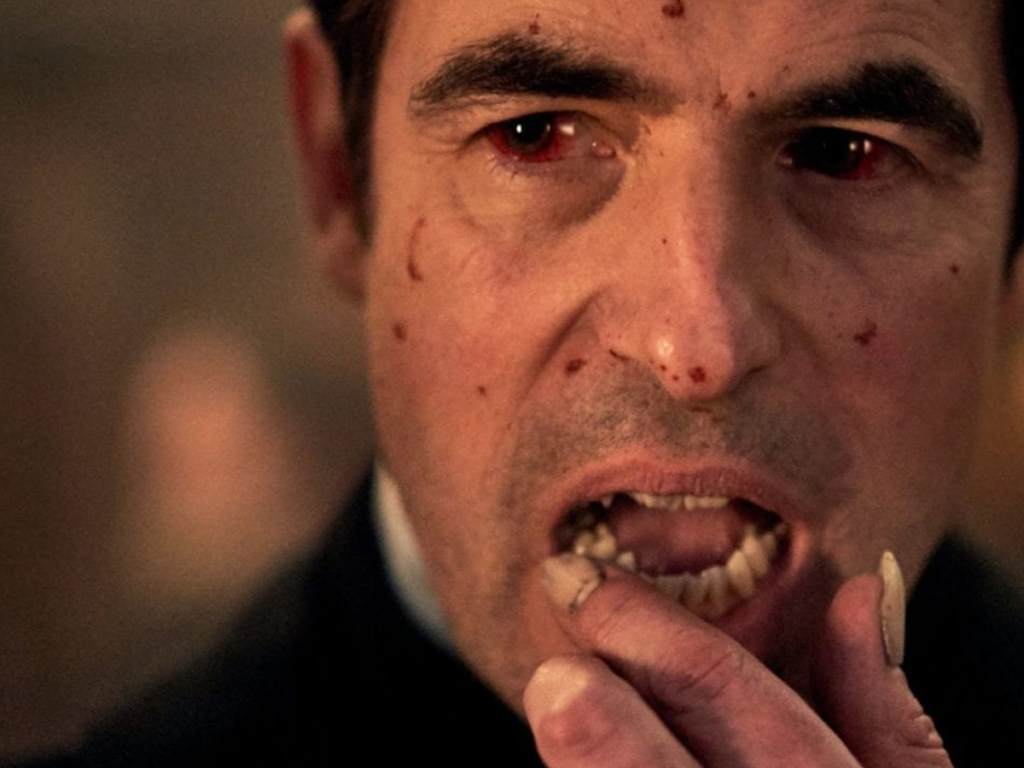It’s always fun to watch re-imaginings of the classics, and Sherlock convinced me that the BBC was a master of doing just that. Dracula, however, is forcing me to re-evaluate the latter assumption.
Dracula’s showrunners (and if you’re curious about that term, check this article out) Steven Moffat and Mark Gatiss have turned the horror classic into slick but ridiculous bit of campy nonsense.
It starts out promisingly enough, with a premise that really made sense. During his convalescence in a convent in Budapest, Harker is confronted by a nun who challenges his written account of his escape from Count Dracula’s clutches and convinces him to relay details she is certain he left out. His confession then becomes the narrative thread of the first installment – The Rules of the Beast – of this 3-part series.
The fact that this premise is precisely anchored on the presumption that we are going to be told the details that were left out of the original manuscript, i.e., Bram Stoker’s novel, is what frees the show to do what it wants with the Dracula story, but at the same time, binds it to the broad outlines, at least, of the vampire mythos. And, yes, this formula worked in episode 1, giving us some truly inspired scenes, such as the confrontation between Dracula and the nun Agatha von Helsing at the convent gates. Sadly, these moments are few and far between.
The rest of time, the portrayals of the main protagonists – Dracula and the nun – are so cartoonish that it jars you out of any suspension of disbelief. Dracula comes off as a giggling, nihilistic, psychopath; and von Helsing’s is just trying too hard to be upend the stereotypical image of a nun, the way perhaps that Sean Connery did for William of Baskerville, in The Name of the Rose. It didn’t work. Nevertheless, as I said, the premise was good enough that I approached episode 2 – Blood Vessel – with a fair amount of anticipation.
The second movie takes place on board the doomed ship, the Demeter. Those who have read the book know that there is very little told about this part of Dracula’s voyage. Basically, all we learn is that the Demeter was used to transport Dracula’s belongings – including boxes of earth where the vampire himself slept – to London. On the way, the crew were picked off one by one, until only the Captain was left. Sure of his own death, the Captain lashed himself to the wheel of the ship, clutching a crucifix. Eventually, the ship sailed into London harbor with the dead captain still tied to the wheel and a look of abject terror on his face. Onlookers claim to have seen a wolf jump off the ship and disappear into the crowd.
In Netflix’s Dracula, the voyage of the Demeter becomes something else entirely: an opportunity for Dracula to brush up on English society norms, as it were – this Dracula takes on the memories of his victims, allowing him to access to some of their skills and attributes. It’s entertaining, but none of it actually advances the story.
All told, Blood Vessel does two things: it serves up a cute easter egg – the name Ruthven – and it sets up the third episode – the Dark Compass. And here’s where I thought that this was a clever mini-series; a worthy companion to Sherlock.
Blood Vessel – after the mind-numbingly contrived chess game with Agatha von Helsing, now a blood-doll, ends with Dracula walking up onto an English beach (a scene reminiscent of the Highlander finding out that he can survive underwater) only to be caught in the spotlight of a helicopter.
Awesome twist, tbh. But one that was ultimately squandered.
The Dark Compass was a mess and, at its climax, revealed the show’s non-sensical thesis – which it had been hinting at since the beginning: that the accepted “truths” about vampires were nothing more than Dracula’s psychosomatic symptoms. If that sounds stupid, that’s because it is. As the show explains it, the vampire has sucked up so much blood that the beliefs of his victims have been transferred onto him, such as their “fear” of the cross, and, I suppose, their fear of the sun? I stopped trying to make sense of it very quickly. If a movie doesn’t care enough about logic to make sure that it exists in the story-telling, then I sure as hell won’t care enough to try to do its job for it.
With each episode clocking in at a little over an hour and a half each, that’s about four and a half hours that I’ve been swindled out of and will never get back.

